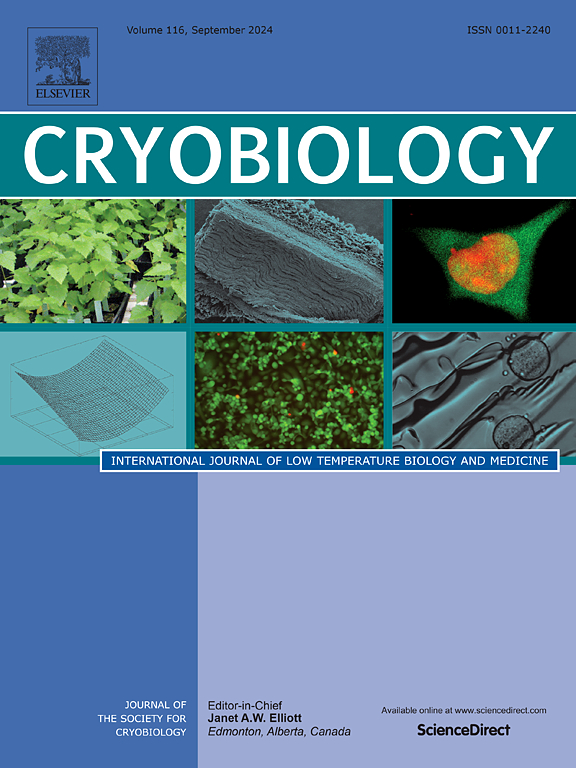Maximizing sleep quality and well-being in female athletes: the role of the menstrual cycle and whole-body cryostimulation
IF 2.1
3区 生物学
Q2 BIOLOGY
引用次数: 0
Abstract
The aim of this study was to evaluate the effects of two menstrual cycle (MC) phases - early follicular phase (EFP) and mid-luteal phase (MLP) - on sleep, well-being, and the effects of whole-body cryostimulation (WBC) in young female athletes. Core temperature (CT) and heart rate variability (HRV) were also assessed to explore the physiological mechanisms underlying these effects, both under control conditions and after WBC. Using a randomized, controlled, cross-over design, seventeen naturally menstruating women (24 ± 3.3 years) were evaluated over two consecutive cycles (cycle length 21–35 days, positive urinary ovulation test). The experimental cycle included two three-day WBC sessions (3 min at −110 °C) compared to a control cycle without WBC. Subjective and objective sleep quality (SQ), CT, and HRV were measured during both cycles. The MC phase did not significantly affect subjective SQ, but was associated with decreased objective SQ and increased fatigue during the MLP compared to the EFP. The MLP was also characterized by elevated CT and increased sympathetic activity, suggesting impaired nocturnal thermoregulation during this phase. WBC improved objective SQ and perceived fatigue during the MLP and appeared to help restore thermoregulatory function, although sympathetic activity remained elevated. These findings suggest that WBC may be an effective intervention to counteract MC-related impairments in sleep and fatigue in female athletes.
最大限度地提高女性运动员的睡眠质量和健康:月经周期和全身冷冻刺激的作用
本研究的目的是评估两个月经周期(MC)阶段——卵泡早期(EFP)和黄体中期(MLP)——对年轻女运动员睡眠、健康的影响,以及全身冷冻刺激(WBC)的效果。我们还评估了核心温度(CT)和心率变异性(HRV),以探讨在对照条件下和白细胞计数后这些影响的生理机制。采用随机、对照、交叉设计,对17例自然月经妇女(24±3.3岁)连续两个周期(周期长度21-35天,尿排卵试验阳性)进行评估。实验周期包括两个为期三天的WBC疗程(在- 110°C下3分钟),与没有WBC的对照周期相比。在两个周期内测量主观和客观睡眠质量(SQ)、CT和HRV。与EFP相比,MC阶段对主观SQ没有显著影响,但与MLP期间客观SQ下降和疲劳增加有关。MLP还表现为CT升高和交感神经活动增加,提示该阶段夜间体温调节受损。白细胞改善了MLP期间的客观SQ和感知疲劳,似乎有助于恢复体温调节功能,尽管交感神经活动仍然升高。这些研究结果表明,白细胞可能是一种有效的干预措施,以抵消mc相关的睡眠和疲劳损伤的女运动员。
本文章由计算机程序翻译,如有差异,请以英文原文为准。
求助全文
约1分钟内获得全文
求助全文
来源期刊

Cryobiology
生物-生理学
CiteScore
5.40
自引率
7.40%
发文量
71
审稿时长
56 days
期刊介绍:
Cryobiology: International Journal of Low Temperature Biology and Medicine publishes research articles on all aspects of low temperature biology and medicine.
Research Areas include:
• Cryoprotective additives and their pharmacological actions
• Cryosurgery
• Freeze-drying
• Freezing
• Frost hardiness in plants
• Hibernation
• Hypothermia
• Medical applications of reduced temperature
• Perfusion of organs
• All pertinent methodologies
Cryobiology is the official journal of the Society for Cryobiology.
 求助内容:
求助内容: 应助结果提醒方式:
应助结果提醒方式:


